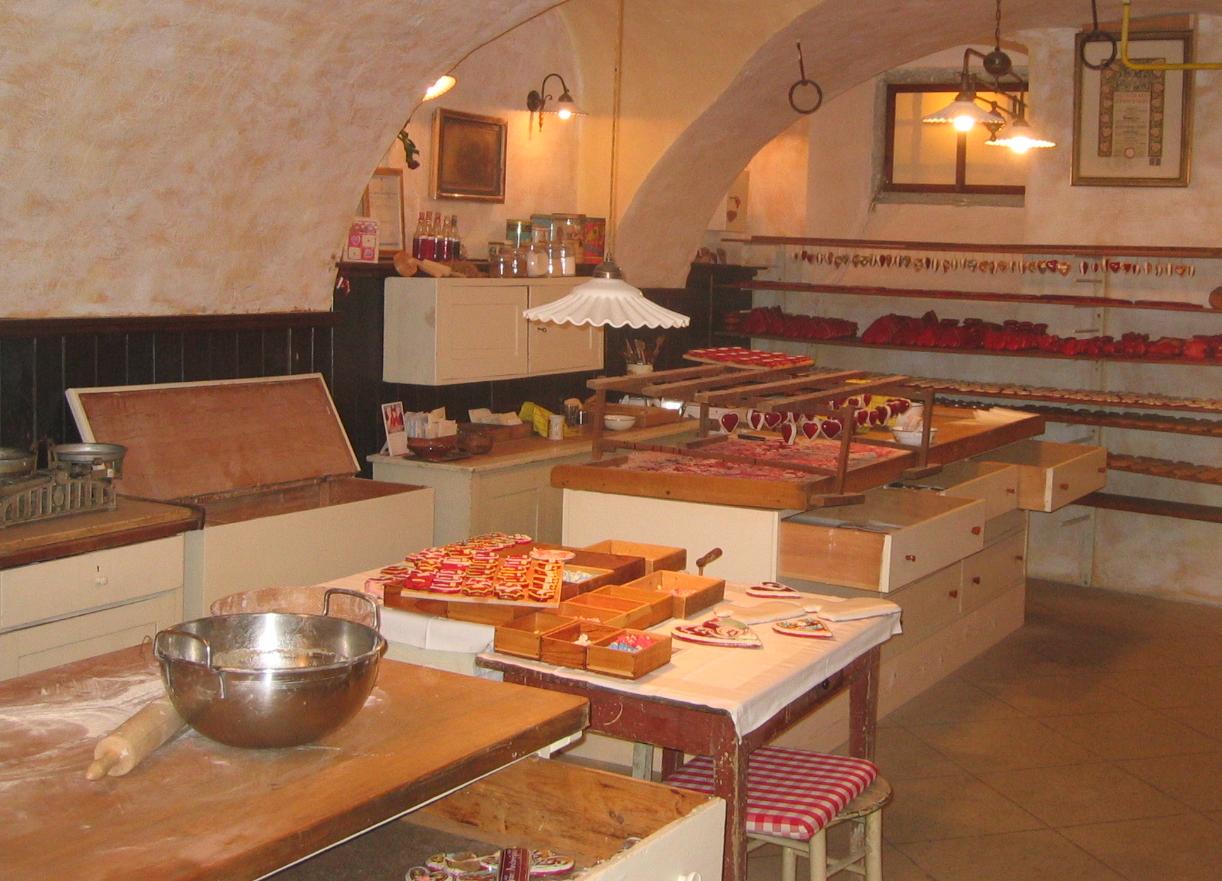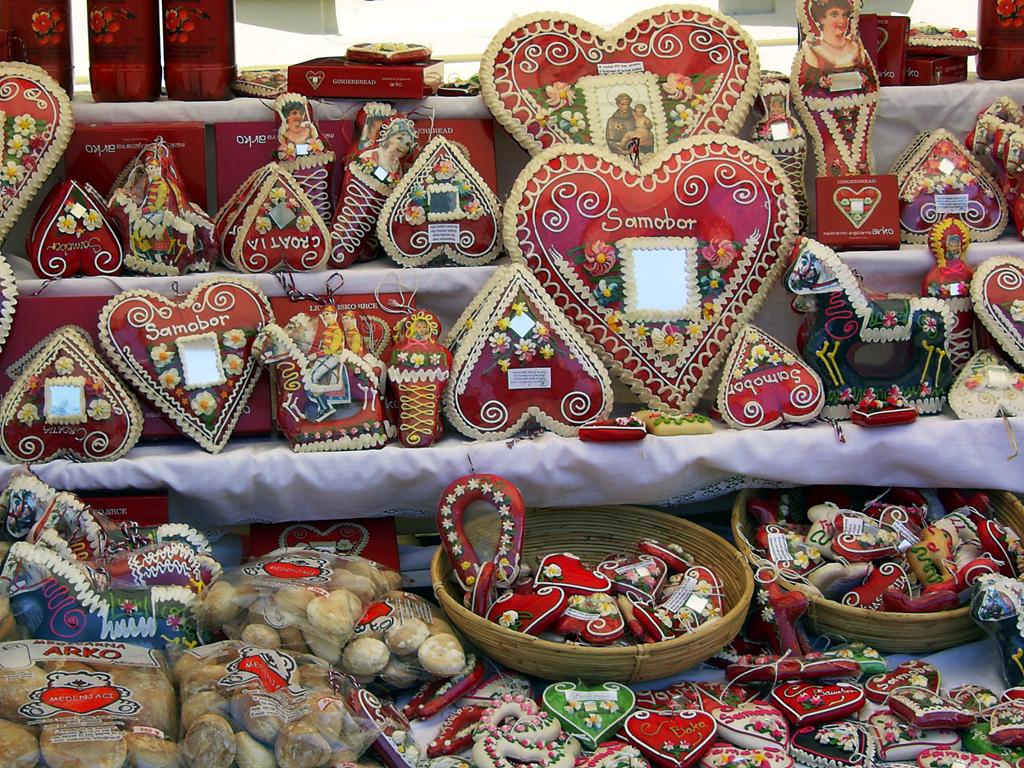Licitar on:
[Wikipedia]
[Google]
[Amazon]
Licitars (; ; ) are colorfully decorated biscuits made of sweet honey dough that are part of
Licitar; toplo srce hrvatskoga puka
/ref> Licitars became famous due to their being sold at the Marian shrine of Marija Bistrica (near Zagreb), which pilgrims visited for the Assumption or St Margaret's Day. Although not a religious symbol, licitars were often bought to take home as a reminder of the long and sometimes arduous journey to Zagorje. Licitars' simple shape and attractive colour and decorations were a keen souvenir to show the family and neighbours upon return.
 The ingredients for licitars are simple (honey, flour, eggs, water and food coloring) but their preparation is long. The dough matures for a few days, after which it is shaped, baked and left to dry for approximately two weeks. Coloring is the next step, after which they are left to dry for two more weeks. Once dry, the licitars are decorated and finally left to dry for another week.
Traditionally, licitars are entirely handmade and tend to be decorated with a swirling outline, small flower shapes and sometimes a miniature mirror. As they are made of honey dough, they remain edible until a certain point in the decoration process.
Licitars are often erroneously referred to as
The ingredients for licitars are simple (honey, flour, eggs, water and food coloring) but their preparation is long. The dough matures for a few days, after which it is shaped, baked and left to dry for approximately two weeks. Coloring is the next step, after which they are left to dry for two more weeks. Once dry, the licitars are decorated and finally left to dry for another week.
Traditionally, licitars are entirely handmade and tend to be decorated with a swirling outline, small flower shapes and sometimes a miniature mirror. As they are made of honey dough, they remain edible until a certain point in the decoration process.
Licitars are often erroneously referred to as
 Licitars are nowadays considered traditional Croatian and Slovenian souvenirs, and can be found in all Croatian and Slovenian airports, as well as in many tourist gift shops. They are also used as Christmas tree decorations, wedding gifts for guests, business gifts and to other ornamental purposes. At times, though uncommonly, they remain in use as symbols of affection.
Licitars are nowadays considered traditional Croatian and Slovenian souvenirs, and can be found in all Croatian and Slovenian airports, as well as in many tourist gift shops. They are also used as Christmas tree decorations, wedding gifts for guests, business gifts and to other ornamental purposes. At times, though uncommonly, they remain in use as symbols of affection.
www.licitarheart.com
Licitar Recipe
{{Authority control Croatian cuisine Slovenian cuisine Culture of Slovenia Masterpieces of the Oral and Intangible Heritage of Humanity Culture in Zagreb
Croatia
Croatia, officially the Republic of Croatia, is a country in Central Europe, Central and Southeast Europe, on the coast of the Adriatic Sea. It borders Slovenia to the northwest, Hungary to the northeast, Serbia to the east, Bosnia and Herze ...
and Slovenia
Slovenia, officially the Republic of Slovenia, is a country in Central Europe. It borders Italy to the west, Austria to the north, Hungary to the northeast, Croatia to the south and southeast, and a short (46.6 km) coastline within the Adriati ...
's cultural heritage. They are a traditional symbol of the Croatian capital Zagreb
Zagreb ( ) is the capital (political), capital and List of cities and towns in Croatia#List of cities and towns, largest city of Croatia. It is in the Northern Croatia, north of the country, along the Sava river, at the southern slopes of the ...
. They are used as an ornamental gift, often given at celebrations of love such as weddings and Valentine's Day
Valentine's Day, also called Saint Valentine's Day or the Feast of Saint Valentine, is celebrated annually on February 14. It originated as a Christian feast day honoring a Christian martyrs, martyr named Saint Valentine, Valentine, and ...
.
In 2010, UNESCO
The United Nations Educational, Scientific and Cultural Organization (UNESCO ) is a List of specialized agencies of the United Nations, specialized agency of the United Nations (UN) with the aim of promoting world peace and International secur ...
added the ''Gingerbread craft from Northern Croatia'' to the "Representative List of the Intangible Cultural Heritage" for Croatian culture.
History and tradition
The tradition of making and giving licitars stretches as far back as the 16th century. Licitar makers, known as ''Medičari'', were highly regarded in society, and their licitars were very much sought after (gifting licitars was considered more sentimental than gifting roses). Even today, the tradition is kept alive by a few producers who keep the art a family secret, and their methods of production have changed very little./ref> Licitars became famous due to their being sold at the Marian shrine of Marija Bistrica (near Zagreb), which pilgrims visited for the Assumption or St Margaret's Day. Although not a religious symbol, licitars were often bought to take home as a reminder of the long and sometimes arduous journey to Zagorje. Licitars' simple shape and attractive colour and decorations were a keen souvenir to show the family and neighbours upon return.
Ingredients and preparation
gingerbread
Gingerbread refers to a broad category of baked goods, typically flavored with ginger root, ginger, cloves, nutmeg, and cinnamon and sweetened with honey, sugar, or molasses. Gingerbread foods vary, ranging from a moist loaf cake to forms nearly ...
, although they do not actually contain ginger
Ginger (''Zingiber officinale'') is a flowering plant whose rhizome, ginger root or ginger, is widely used as a spice and a folk medicine. It is an herbaceous perennial that grows annual pseudostems (false stems made of the rolled bases of l ...
.
Contemporary use
 Licitars are nowadays considered traditional Croatian and Slovenian souvenirs, and can be found in all Croatian and Slovenian airports, as well as in many tourist gift shops. They are also used as Christmas tree decorations, wedding gifts for guests, business gifts and to other ornamental purposes. At times, though uncommonly, they remain in use as symbols of affection.
Licitars are nowadays considered traditional Croatian and Slovenian souvenirs, and can be found in all Croatian and Slovenian airports, as well as in many tourist gift shops. They are also used as Christmas tree decorations, wedding gifts for guests, business gifts and to other ornamental purposes. At times, though uncommonly, they remain in use as symbols of affection.
See also
* National symbols of Croatia * Culture of Croatia * Culture of Slovenia *Lebkuchen
(), or () are honey-sweetened German cuisine, German cakes, moulded cookies or bar cookies that have become part of Germany's Christmas traditions. They are similar to gingerbread.
Etymology
The etymology of ''Leb-'' in the term is unc ...
References
External links
www.licitarheart.com
Licitar Recipe
{{Authority control Croatian cuisine Slovenian cuisine Culture of Slovenia Masterpieces of the Oral and Intangible Heritage of Humanity Culture in Zagreb